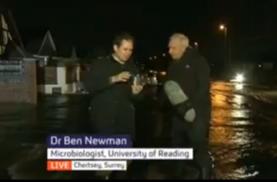Heavily-contaminated water found in Thames Valley - Dr Ben Neuman's analysis
Release Date 17 February 2014

High-levels of faecal-contaminated, disease-ridden bacteria have been found in floodwater in the Thames Valley Wraysbury, Berkshire in University of Reading analysis for Sky News and Channel 4 News.
Microbiologist Dr Ben Neuman found 100,000 bacteria per 100 millilitres, including e-coli - where one would expect one per 100 millilitres in drinking water. There are legal limits of 100 per millilitres in swimming water, while the World Health Organisation says agricultural water should have no more than 1,000 bacteria per 100 millilitres.
He also tested for microbes that could grow in the presence of the synthetic antibiotic ampicillin (a type of penicillin) finding high-levels of bacteria resistant to antibiotics.
Dr Neuman said these bacteria could cause typhoid fever, dysentery and hepatitis - but added the risk would be hugely reduced if good hygiene practice was followed.
He said the snapshot analysis in Chertsey, Surrey and Wraysbury, Berkshire shows that most of the contamination is being carried into homes directly from the River Thames - and said it was a surprise that the bacteria had not been diluted by the unprecedented rainfall over the winter.
The results were similar to that found by the University at a farm in Moorland on the Somerset Levels a fortnight ago with Sky News.
Dr Neuman said: "We found high-levels of coliform bacteria, which point to recent faecal contamination from farm animal waste or from flooded toilets. We also found high amounts of bacteria which are resistant to antibiotics, similar to MRSA. Both were a real surprise - normally one would expect the bacteria levels to be diluted by the sheer amount of rain we've had in the last few weeks.
"This contaminated water is dirty rather than dangerous. The only danger is if you get it in your mouth unwittingly and ingest it. One would expect to come down with a fair sized bout of dysentery, most likely a bloody diarrhoea.
"The earth purifies itself over time because bacteria does not survive very well in the cold hard world - but it might be a month after the water goes down before we can expect levels return to normal. Sunlight is the key to killing these bacteria so they may linger longer in darker houses or basements.
"People should use common sense and follow Public Health England's clear guidelines. People should wash their hands after coming into contact with the floodwater, especially if they're going to preparing food, and avoid eating food that has touched flood water. Eating fresh food from the fridge or freezer if your electricity has been turned off and cleaning work surfaces before and after preparing food is very important."
The Environment Agency is undertaking ongoing tests in floodwater affected by overflowing sewers at 17 sites on behalf on behalf of Thames and Southern Water.
